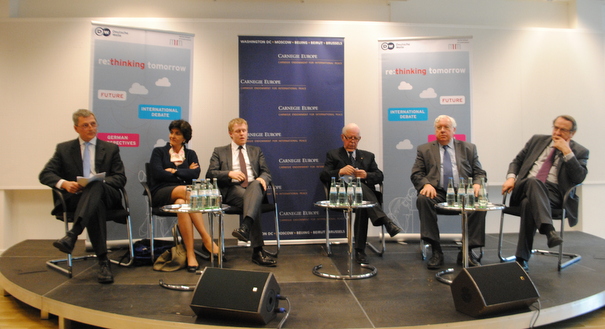{
"authors": [
"Kurt Biedenkopf",
"Henrik Enderlein",
"Sylvie Goulard",
"John Kornblum",
"Terry Martin",
"Quentin Peel"
],
"type": "event",
"centerAffiliationAll": "",
"centers": [
"Carnegie Endowment for International Peace",
"Carnegie Europe"
],
"collections": [],
"englishNewsletterAll": "",
"nonEnglishNewsletterAll": "",
"primaryCenter": "Carnegie Endowment for International Peace",
"programAffiliation": "",
"programs": [],
"projects": [],
"regions": [
"Europe"
],
"topics": [
"Foreign Policy",
"EU"
]
}
Germany: Making or Breaking Europe?
Tue, March 27th, 2012
Brussels
IMGXYZ3604IMGZYXWhat began as a crisis for the euro has quickly turned into a crisis for the European Union, prompting a series of broader strategic questions about what Europe is, where it is heading, and who leads it. Germany has thus far taken the lead in bankrolling and negotiating Europe’s bailout funds, but will Berlin play a similar role in tackling tough political reforms as the balance of power in Europe continues to shift?
Carnegie Europe, with the Hertie School of Governance and Deutsche Welle, assembled a high-level team to explore the key factors shaping German national politics and Europe’s future. Discussants included former Prime Minister of Saxony Kurt Biedenkopf, Hertie School of Governance professor Henrik Enderlein, Member of the European Parliament Sylvie Goulard, former U.S. Ambassador to Germany and current Center for Strategic and International Studies senior adviser John Kornblum, and Financial Times chief correspondent Quentin Peel. Deutsche Welle reporter Terry Martin moderated.
Key Points of Discussion
- Germany’s Role in Europe: Martin began the discussion with the question, “Is Germany making or breaking Europe?” Biedenkopf argued that the question shouldn’t lie in whether Europe can be made or broken by Germany, but rather in “how we can continue on a European path, on which we have already accomplished so much”.
- A New Era: Kornblum asserted that Europe and the European Union are entering a new era of dramatic change amid the ongoing euro crisis. The question of Germany’s leadership role at this historic turning point sparked heated debate among the panelists.
- Leadership Role: Biedenkopf asserted that Germany has an obligation to lead as the strongest and most globalized economy in the eurozone. Enderlein insisted that the monetary union which was created without economic union needs to be managed by the seventeen countries together, steered not by Germany but by EU institutions set up to govern a common currency area. Peel added that Germany has shown leadership (Angela Merkel has fundamentally set the crisis agenda and timescale) but that Germans seem uncomfortable with this role. It has been accused of showing too much leadership, Peel added, and every decision made in regards to the eurozone crisis is viewed by many Europeans as having German fingerprints all over it. The imbalance of Germany’s leadership role in Europe and its discomfort with that role is a major dilemma.
- Beyond the Economic Dimension: Enderlein warned that the strength of the German economy is not set in stone, observing that it has succeeded because of the European Union, not despite it. Goulard agreed that Germans have demonstrated leadership, but argued that leadership cannot be solely about economics and competition. Goulard added that there are areas, such as data protection and privacy, where Germany provides a model for other EU members and others, such as the role of women in society and the flexibility of services, where Germany can learn from other EU members.
- Moving Forward in Democracy: Instead of calling for more Europe, Goulard called for more democracy in Europe. She insisted that the future of the European Union relies not on internal alliances, but on its institutions working within a framework of transparency, rules, and accountability, legitimized by and accepted in public debate. Panelists agreed with her sentiment that if one is to inspire the people of Europe, it must consult the original purpose of European integration: to contribute together to a better world.
Carnegie does not take institutional positions on public policy issues; the views represented herein are those of the author(s) and do not necessarily reflect the views of Carnegie, its staff, or its trustees.
Event Speakers
Kurt Biedenkopf
Henrik Enderlein
Sylvie Goulard
John Kornblum
Centre for Strategic and International Studies
Terry Martin
Quentin Peel